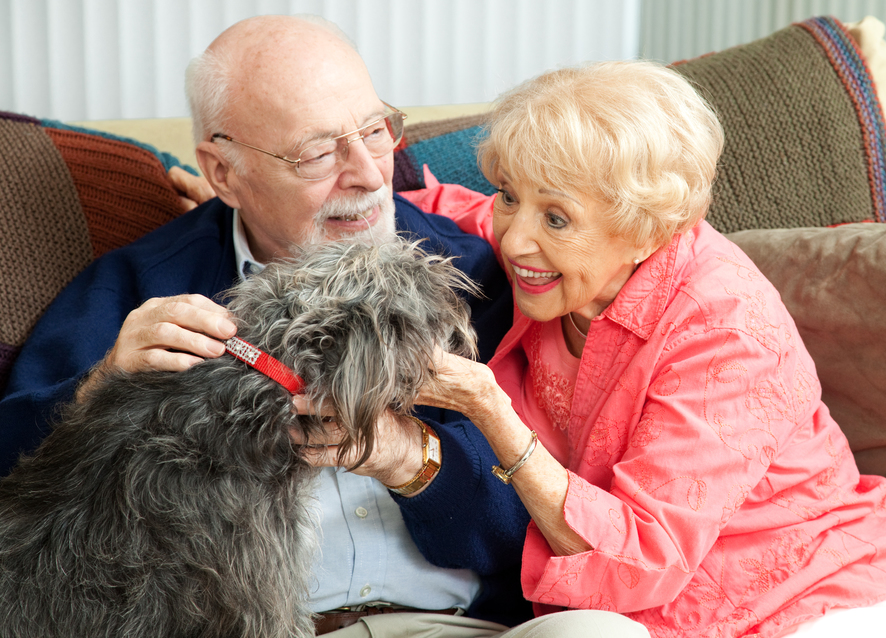The Impact of Pet Ownership for Seniors
Their names are Scruffy, Ruffy, Midnight and Puddin’Pie. Then there’s Tuvia, Tova, Sheina and Butch. These are the names of dogs and cats – pets whose owners I’ve come to know and love over the years that I served as a campus and resident rabbi at several Tampa Bay retirement homes. And during those years I had direct experience with what sociologists, psychologists and gerontologists report about senior citizens and pets – specifically it’s a fabulous combination that promotes mental and physical health.
In an article by Freedom Ahn that first appeared in the Huffington Post’s “Healthy Living” (12/2016) and was reprinted in the publication of the Madlyn and Leonard Abramson Center for Jewish Life, we learn about “The Paw-sitive Effect of Pets,” especially for elderly pet owners. Researchers confirm that the health benefits for seniors who have pets include:
- Reduction of blood pressure
- Reduction of depressed mood by increasing serotonin and dopamine levels
- Reduction of visits to a doctor
- Increased opportunities to exercise
- Opportunity to meet new people
- Reduction in loneliness
Yet although the benefits of elderly pet ownership seem obvious, there are misconceptions that abound. For example, Helen is a woman in her 90’s who says “I am in love with my cat. Her name is Tova and I’ve had her for ages. We’re best friends. So I told my daughter, I’m not going into a retirement home. They won’t take Tova so they won’t have me either!”
Years ago, before gerontology professionals understood the positive impact of a pet’s companionship on an aging senior, most retirement facilities would not accept a resident’s cat or dog. But now, with what we know about the health benefits related to pet ownership, the situation has changed for the better. Thanks to an online clearinghouse, After55.com , it is now possible to find pet friendly senior housing and even pet friendly assisted living facilities all over the US. In fact After55.com reports that a whopping 78% of our senior living communities welcomed pets. They say, “Pet-friendly senior housing units usually allow cats, small- to medium-sized dogs, and other small animals such as birds and fish. Some senior communities have “community” dogs and cats that live on site. A few nursing homes and assisted living facilities even have pet chickens. You may even find a community that offers pet care and grooming among its extra services.”
“But what if I get sick? Need an operation? Have to go to the hospital or rehab?” That’s the question Art asked as he considered adding a sweet young rescue dog as a live-In companion. “I want to have a dog,” Art says, “But I want to be responsible, too. Who will take my dog if I’m incapacitated?”
Art’s concerns are legitimate ones; so much so that pet-loving volunteers created a unique service, “Pact for Animals,” that matches pets with foster families when the pet owner needs someone to care longer term for a dog or cat.
Originally designed to serve military personnel who faced deployment and needed a long term living solution for a beloved pet, Pact for Animals now offers family fostering opportunities for elderly pet owners who face surgery or rehabilitation. Pact for Animals reports “(We give) peace of mind to hospital patients and military personnel by placing their pets into temporary foster homes until their owners can be reunited with the devoted companions they love.”
Founded in 2011 as the first organization of its kind, PACT has facilitated the placement of more than 700 companion pets nationwide. The service is offered at no charge, however Pact requires the owner to reimburse the foster family for their pet’s food, grooming, and medical expenses.
The Senior Solutions Center at Colorado’s Jewish Family Services puts it well when they say, “For seniors and those living alone, pets can have a profound impact on quality of life. “ Baruch HaShem, there are now senior housing opportunities that understand this basic principle and organizations such as Pact for Animals that offer help and peace of mind to senior pet owners as they age.

